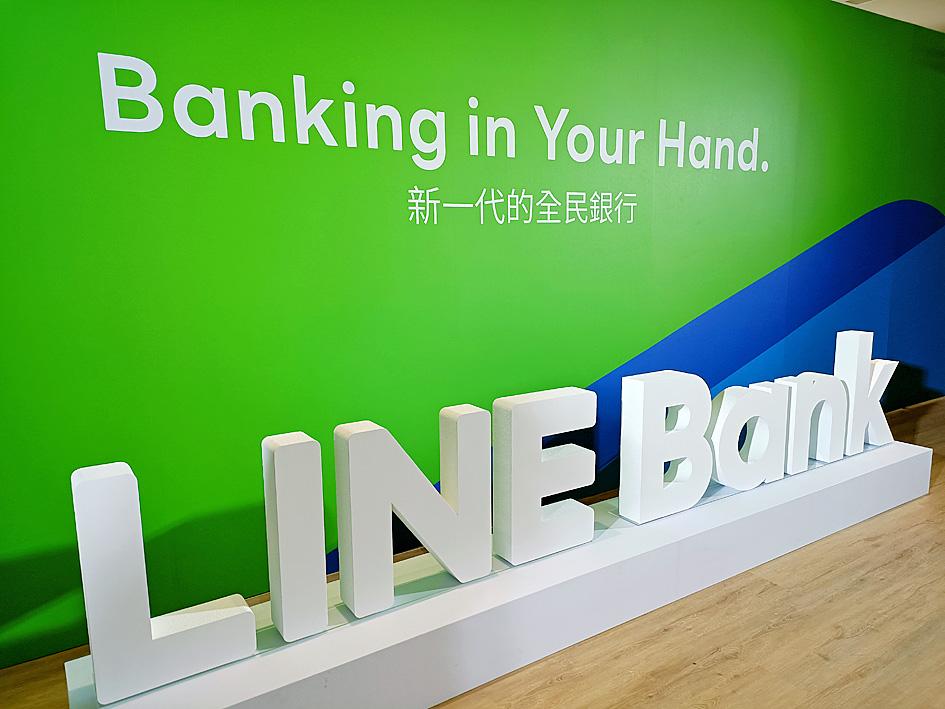A report by Web-only Line Bank Taiwan Ltd (連線商業銀行) explaining why its information system crashed on the first day of operation was not satisfactory and the Financial Supervisory Commission (FSC) would demand that the bank improve its operations, commission Chairman Thomas Huang (黃天牧) said yesterday.
The commission on April 23 asked the virtual bank to submit a report on the crash and the lender has submitted it, Huang told a meeting of the legislature’s Finance Committee in Taipei.
“However, we cannot completely accept the report,” Huang said.

Photo: Lee Chin-hui, Taipei Times
The commission had prior to its launch requested Line Bank to adequately conduct stress tests to prevent any system failures, but the crash has revealed that the bank did not honor its commitment, he said.
The commission would demand that the bank reflects on the incident and improve itself, he added.
Line Bank attributed the crash to a system overload on April 22, the first day of its formal operations.
According to the bank’s report, the overload happened because too many users accessed its platform via a single channel — the messaging app Line — as the bank’s app was not available, despite pledges to launch it, Banking Bureau Director-General Sherri Chuang (莊琇媛) said.
The bank also said that a system that identifies and authenticates users’ identity cards was too sensitive, and occupied too much storage space, which also contributed to the crash, Chuang said.
Some lawmakers on the committee criticized Line Bank’s service.
Democratic Progressive Party (DPP) Legislator Chiang Yung- chang (江永昌) said that the bank asks users to share information about their friends and their Line chat history during registration.
The bank does not allow users to decline the request, Chiang said, adding that the app does not have any “decline” option in its interface.
“How can the bank ask me to provide my friends’ information? And why does the bank need that information?” Chiang said.
Taiwan People’s Party Legislator Jang Chyi-lu (張其祿) said the bank’s identification system was poor and users had to wait on the telephone to reach customer service.
“Web-only banks should offer a more convenient service than conventional banks, but it [Line Bank] does not,” Chang said.
The commission understands the issues and would take necessary measures, Huang said.

PERSISTENT RUMORS: Nvidia’s CEO said the firm is not in talks to sell AI chips to China, but he would welcome a change in US policy barring the activity Nvidia Corp CEO Jensen Huang (黃仁勳) said his company is not in discussions to sell its Blackwell artificial intelligence (AI) chips to Chinese firms, waving off speculation it is trying to engineer a return to the world’s largest semiconductor market. Huang, who arrived in Taiwan yesterday ahead of meetings with longtime partner Taiwan Semiconductor Manufacturing Co (TSMC, 台積電), took the opportunity to clarify recent comments about the US-China AI race. The Nvidia head caused a stir in an interview this week with the Financial Times, in which he was quoted as saying “China will win” the AI race. Huang yesterday said

Japanese technology giant Softbank Group Corp said Tuesday it has sold its stake in Nvidia Corp, raising US$5.8 billion to pour into other investments. It also reported its profit nearly tripled in the first half of this fiscal year from a year earlier. Tokyo-based Softbank said it sold the stake in Silicon Vally-based Nvidia last month, a move that reflects its shift in focus to OpenAI, owner of the artificial intelligence (AI) chatbot ChatGPT. Softbank reported its profit in the April-to-September period soared to about 2.5 trillion yen (about US$13 billion). Its sales for the six month period rose 7.7 percent year-on-year

Nissan Motor Co has agreed to sell its global headquarters in Yokohama for ¥97 billion (US$630 million) to a group sponsored by Taiwanese autoparts maker Minth Group (敏實集團), as the struggling automaker seeks to shore up its financial position. The acquisition is led by a special purchase company managed by KJR Management Ltd, a Japanese real-estate unit of private equity giant KKR & Co, people familiar with the matter said. KJR said it would act as asset manager together with Mizuho Real Estate Management Co. Nissan is undergoing a broad cost-cutting campaign by eliminating jobs and shuttering plants as it grapples

MORE WEIGHT: The national weighting was raised in one index while holding steady in two others, while several companies rose or fell in prominence MSCI Inc, a global index provider, has raised Taiwan’s weighting in one of its major indices and left the country’s weighting unchanged in two other indices after a regular index review. In a statement released on Thursday, MSCI said it has upgraded Taiwan’s weighting in the MSCI All-Country World Index by 0.02 percentage points to 2.25 percent, while maintaining the weighting in the MSCI Emerging Markets Index, the most closely watched by foreign institutional investors, at 20.46 percent. Additionally, the index provider has left Taiwan’s weighting in the MSCI All-Country Asia ex-Japan Index unchanged at 23.15 percent. The latest index adjustments are to